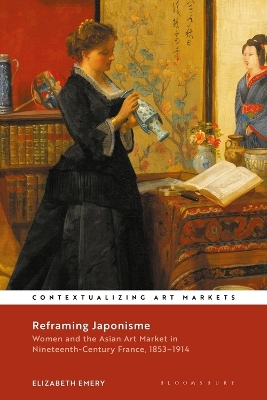Contextualizing Art Markets
1 total work
Japonisme, the nineteenth-century fascination for Japanese art, has generated an enormous body of scholarship over the last twenty years, but most of it neglects women, who also acquired objects from the Far East and displayed them in their homes before selling or bequeathing them to museums. The stories of women collectors and shopkeepers rarely appear in memoirs left by those associated with the japoniste movement.
The present volume thus brings to light the culturally important, yet largely forgotten artistic activities of women such as Clemence d'Ennery (1823-1898), who began collecting Japanese and Chinese chimeras in the 1840s, built a house for them in the 1870s, and bequeathed the 'Musee d'Ennery' to the state as a free public museum in 1893. A friend of the Goncourt brothers and a fifty-year patron of Parisian dealers of Asian art, d'Ennery's struggles to gain recognition as a collector and curator serve as a lens through which to examine the japonisme of other women of her day, from dealers of Japanese art (Madame Desoye, Florine Langweil), salon hostesses (Princesse Mathilde, Louise Cahen d'Anvers), and writers and actresses (Judith Gautier, Sarah Bernhardt), to travellers (Isabella Stewart Gardner, Louisine Havemeyer), and artists (Mary Cassatt, Marie Nordlinger).
Largely absent from the history of japonisme, these women-and many others-actively collected Japanese art, interacted with auction houses and art dealers, and formed collections now at the heart of museums such as the Louvre, the Musee Guimet, the Musee Cernuschi, the Musee Unterlinden, and the Metropolitan Museum of Art.
The present volume thus brings to light the culturally important, yet largely forgotten artistic activities of women such as Clemence d'Ennery (1823-1898), who began collecting Japanese and Chinese chimeras in the 1840s, built a house for them in the 1870s, and bequeathed the 'Musee d'Ennery' to the state as a free public museum in 1893. A friend of the Goncourt brothers and a fifty-year patron of Parisian dealers of Asian art, d'Ennery's struggles to gain recognition as a collector and curator serve as a lens through which to examine the japonisme of other women of her day, from dealers of Japanese art (Madame Desoye, Florine Langweil), salon hostesses (Princesse Mathilde, Louise Cahen d'Anvers), and writers and actresses (Judith Gautier, Sarah Bernhardt), to travellers (Isabella Stewart Gardner, Louisine Havemeyer), and artists (Mary Cassatt, Marie Nordlinger).
Largely absent from the history of japonisme, these women-and many others-actively collected Japanese art, interacted with auction houses and art dealers, and formed collections now at the heart of museums such as the Louvre, the Musee Guimet, the Musee Cernuschi, the Musee Unterlinden, and the Metropolitan Museum of Art.
